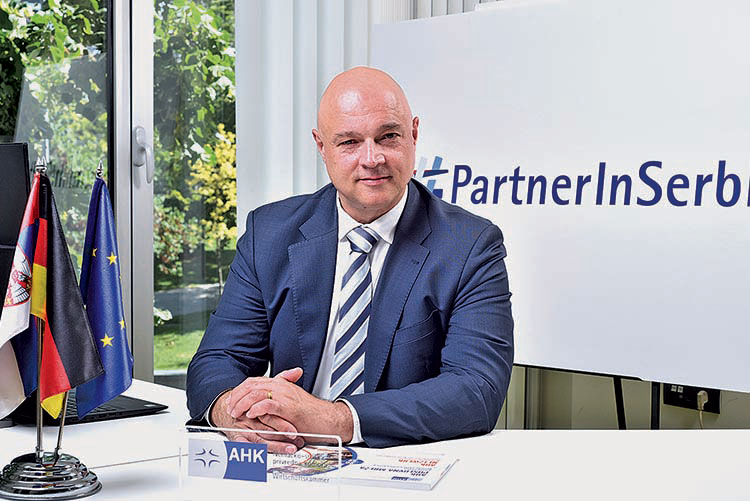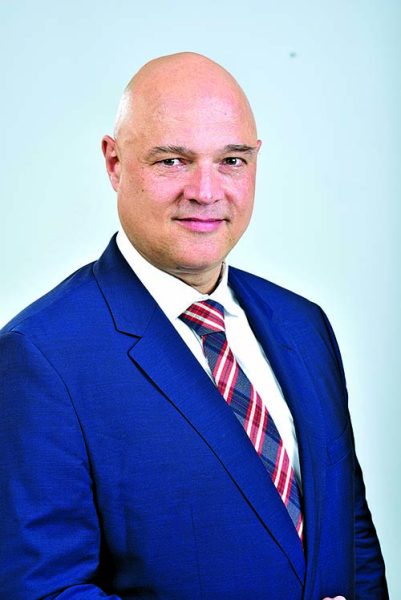German companies find Serbia to be an appealing market for sourcing and investments, but they acknowledge its risks, including geopolitical crises, regional conflicts, high prices and economic slowdowns in key export markets, which create a level of uncertainty
During the first four months of 2023, trade in goods between Germany and Serbia reached a value of nearly three billion euros – according to data from the German Federal Statistical Office. This marks an increase of almost 18 per cent.
The foreign trade exchange between the Federal Republic of Germany and the Republic of Serbia increased nominally by 26.3% in 2022, partly due to rising prices, but only partly. “These data indicate significant growth,” says Alexander Markus, Executive Member of the Board of the German-Serbian Chamber of Commerce, who expects a new record total in the bilateral trade exchange between our countries to be set this year.
These positive results are due to ever-more German companies producing or expanding their existing manufacturing sites in Serbia. Most of these projects produce components for German industry.
“In the opinion of our members, as expressed in the latest AHK survey on business conditions in Serbia, the assessment of the economic situation in Serbia for the year 2023 has not deteriorated,” says our interlocutor.

Almost half of surveyed AHK respondents (47%) rate their business as good, while only 6% consider it as being less than satisfactory. Business forecasts for the current year also show optimism, with only 7% of those surveyed expressing concerns about a worsening of their turnover and results.
“For German companies, Serbia remains an attractive market for sourcing and investments,” explains Markus. “Nevertheless, they also mentioned certain risks: geopolitical crises and regional conflicts, high prices, and economic slowdowns in key markets of Serbian exporters, which create a certain level of uncertainty for them.”
How would you assess the impact of the Purchasing Initiative Western Balkans in terms of boosting exchanges between companies from Serbia and prospective German partners?
– We particularly recommend looking for new partners in times of supply chain challenges, global uncertainties and transformation processes. Still, market transparency and qualified access to procurement markets remain relevant topics in Serbia. Western Balkan countries have great potential. However, it is not just about sheer quantity – the increasing quality of Serbian companies’ products is evident. Moreover, this initiative focuses on knowledge-sharing, best practices and technology transfers. It has thus contributed significantly to making Serbian suppliers’ products better and to enhancing their competitiveness.
But this only advances one step at a time. First, a German buyer demands samples. They then discuss what needs to be changed to achieve the required quality. The Serbian company must sometimes invest in new equipment, because they cannot attain the necessary quality using their existing machinery. From time to time, the buyer company supports the supplier in doing this, for example by signing long-term contracts or agreeing to specific grace periods.
This year’s main B2B event of the Supplier Initiative is scheduled to take place in Cologne on 12th October. More than 50 German companies have already confirmed their participation. Interested German companies predominantly come from the metal processing sector, automotive supply sector, plastic processing and plastic materials production sector, as well as a smaller number of companies from the electrical engineering and electronics sector.
How often do you organise events at which German and Serbian companies can exchange practices and insights related to technological advancements in their respective sectors and prospects for cooperation?
– We are very proud that we facilitate real exchanges of experience and insights between German and Serbian companies, particularly pertaining to technological advancements in their respective sectors and the potential for collaboration.
Throughout the calendar year, we organise a series of targeted events and delegation trips designed to bring together key stakeholders from both sides, with the aim of establishing business contacts, exchanging knowhow and experiences of businesses, as well as deepening collaboration between German and Serbian companies.
Seeking new partners is a must during times of supply chain challenges. Increased market transparency and access in Serbia are thus important
These events vary in nature, ranging from specialised workshops and industry-focused seminars to high-profile conferences and innovation showcases. Our strategic approach ensures that these gatherings are not only informative, but also conducive to forging meaningful connections and partnerships.
Participants in the project Civil Security Technologies and Services in Serbia and Albania had an opportunity this past February to hear about the latest trends in the field of civil security from German experts and companies.
Raising awareness among members about the importance of energy efficiency and sustainability is one of our strategic objectives. That’s why we organised a professional conference on the topic of Energy Efficiency in Buildings in Serbia and Montenegro in May this year. This was an opportunity to hear presentations of experts from Germany and Serbia on this current topic, as well as to get acquainted with German companies and their products and solutions in this field.
During the upcoming autumn, the Chamber is organising study-business trips for Serbian companies and organisations to Bavaria on the topic of “Smart Cities and Digitalisation,” as well as study-business trips for Serbian companies to Baden-Württemberg on the topic of “Agricultural Equipment and Machinery”. These trips are intended to establish business contacts, exchange experiences and acquire knowledge of modern technologies applicable to these directions.
We are witnessing that Serbia, with the support of the EU, is investing a lot in new roads, railways, and broadband internet. Do you think these efforts will encourage German companies to expand further into smaller Serbian cities?
– Yes, I absolutely think so! Infrastructure investments are a major lever for making remote areas more attractive to investors. Let me give you an example: I visited two of our member companies in Ivanjica in August. They are awaiting the extension of the motorway to link the town to the next bigger city, Čačak. When this happens, the driving time between these locations will be reduced to 20 minutes. This will be a gamechanger for a town like Ivanjica, and an important factor in attracting qualified workers to Ivanjica, because people will be able to commute between the two locations quickly and easily.

Infrastructure projects have the potential to reshape the economic landscape and to have a significant influence on the strategic decisions of German companies to come to Serbia in the future. That was actually the essence of the business development concept following German reunification in the 1990s. Namely, every Deutschmark invested in infrastructure improvement paid back threefold: firstly as income for the companies executing these projects; secondly as an advantage at the regional level – because East German infrastructure was soon more modern than that of the West; and thirdly as a boost to quality of life for the people living there, which finally brought a halt to the outflow of people from East to West.
This is why investment in infrastructure also has a profound ripple effect in Serbia that extends beyond major urban centres. The development of new roads and railways not only eases travel conditions, but also opens up remote regions, including smaller Serbian towns. And that’s what we see when it comes to investment from Germany: new investors are today usually seeking sites in medium-sized Serbian cities or smaller towns.
How do you consider the effects of the implementation of the Due Diligence Act in Serbia? Will this initiative help companies retain the best workers?
— The vast majority of German companies would not need a law like the “Lieferkettensorgfaltspflichtengesetz”, which we translate into English as “Due Diligence Act”. There is a Latin proverb “nomen est omen” [meaning ‘the name is a sign’]. Unfortunately, there are always some black sheep, that cannot be avoided.
In Germany, but not only there and actually all over Europe, we have this term “honourable merchant – der ehrbare Kaufmann”. This term comes from medieval times and played an important role in the Northern German “Hanse” [Guild]. It equates to trust, first of all, because this is a core value and precondition for every business endeavour. But where does trust come from? It comes from honesty, from a commitment to responsible business practices that include good working conditions, employee health and safety, and a sense of contributing to the greater social good. Such factors certainly play an important role in enhancing job satisfaction and engendering a stronger sense of loyalty among employees.
| RECORD I expect a new record total in the bilateral trade exchange between our countries this year | INFRASTRUCTURE Infrastructure investments are a major lever for making remote areas more attractive to investors | KNOWLEDGE During the upcoming autumn, the Chamber is organising studybusiness trips for Serbian companies to acquire knowledge of modern technologies |
|---|